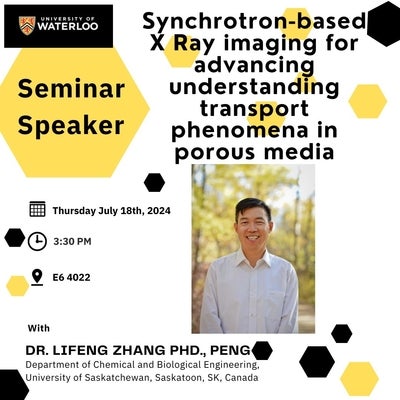
Abstract
Visualization of transport phenomena in porous media is a challenge as most of the porous materials are opaque. Current visualization methods usually suffer from low spatial and temporal resolutions, which poses challenges on advancing understanding of transport phenomena in porous media. In the past few years, my research team employed an advanced synchrotron X-ray imaging technique available at the Canadian Light Source (CLS) to understand liquid water transport in gas diffusion layers (GDLs) for proton exchange membrane fuel cells (PEMFCs) and dynamic granulation of pharmaceutical powders. Due to its high photon energy flux, synchrotron X ray imaging techniques possess high spatial and temporal resolutions, which enables visualization of dynamic processes such as thawing and desaturation processes on frozen gas diffusion layers for proton exchange membrane fuel cells. The knowledge revealed from the advanced X ray imaging techniques provides better design and operation of GDLs for PEMFCs under sub-zero operating temperatures. Another interesting application of synchrotron-based X ray imaging techniques is to capture dynamic processes of wet granulation in the pharmaceutical industry. Wet granulation is a critical unit operation for making tablets in the pharmaceutical industry and water is a typical liquid binder. For the first time, water penetration in the powder bed has been visualized through synchrotron X ray imaging techniques. Data on pore studies throughout the nucleation and growth stages of the dynamic wet granulation process were provided. Our results revealed how wet granulation and the resulting granules were affected by liquid-powder interactions. The new information gained from this research is useful for choosing the desirable powders and process conditions for granulation processes in chemical, fertilizer, food, and pharmaceutical industries.
Biography
Dr. Lifeng Zhang is a professor in the Department of Chemical and Biological Engineering at the University of Saskatchewan. He obtained both his Bachelor and MSc degrees in Chemical Engineering from Zhejiang University. He received another MSc degree from Singapore-MIT Alliance (SMA) before he came to Waterloo for his PhD studies under supervision of Dr. Garry Rempel. He completed his PhD in chemical engineering in 2006. Afterwards, he spent three years working as a postdoctoral research fellow at UBC. Before he took on the faculty position in the Department of Chemical and Biological Engineering at the University of Saskatchewan in 2013, he worked as a senior project engineer with RESGroup Inc. His research interests include reaction engineering, process design and optimization, particle technology and fluidization, and sustainable process development. He has published around 80 peer-reviewed journal articles, 50+ conference presentations and one book chapter.
Besides research, Dr. Zhang has been dedicating himself to both undergraduate and graduate teaching in chemical engineering and he received 2023 Provost’s College Awards for Outstanding Teaching.